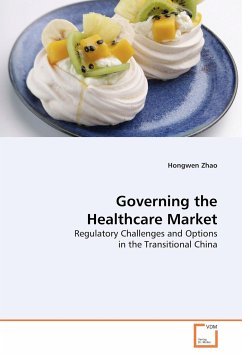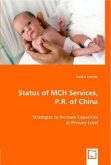The Chinese healthcare system has evolved from a centralized, egalitarian public system (1949-1979) to one which can be characterized as public identity, private behavior, health system (1980-1999). With blurring of the distinction between public and private governing systems, high cost, high volume services are offered through excessive entrepreneurial practices. Regulating healthcare market has emerged as an essential issue. Without an effective state health financing tool, nor mature market institutions, China has adopted a management-based regulation but the absence of effective governance structure hinders effective regulation. To improve healthcare quality and contain costs, China will need to develop public financing tools to alter the current perverse incentives of provider. Government will also need to work with civil society organizations to develop tools governing clinical practice, such as clinical audit for risk management and hospital accreditation programs. To do so requires establishing arms-length governance mechanisms between health departments and hospitals, and corporate governance structures within hospitals.
Bitte wählen Sie Ihr Anliegen aus.
Rechnungen
Retourenschein anfordern
Bestellstatus
Storno








